From May 21 to May 25, the Tsinghua PBCSF Belt and Road Initiative (BRI) EMBA Program hosted its Beijing module. The module featured a comprehensive three-part agenda—corporate immersion, academic learning, and cross-disciplinary exchange. Students visited cutting-edge enterprises such as Megvii, Xiaomi, Kingsoft Office, and Cylingo Group to explore real-world applications of AI and ecosystem-based innovations.
The academic track offered six advanced courses on brain-computer interface technologies, the convergence of neuroscience and AI, green investment strategies, military security and global strategy, international trade disputes, and the application of game theory in business—building a truly interdisciplinary knowledge base.
Two peer-led sessions—a “Bring Your Insight” roundtable and a special forum on investment opportunities in Central Asia—encouraged dialogue across sectors. The module’s multidimensional approach provided students with a dynamic, immersive platform for strategic thinking and technological foresight, equipping global executives to navigate digital transformation and globalization with sharpened decision-making capabilities.
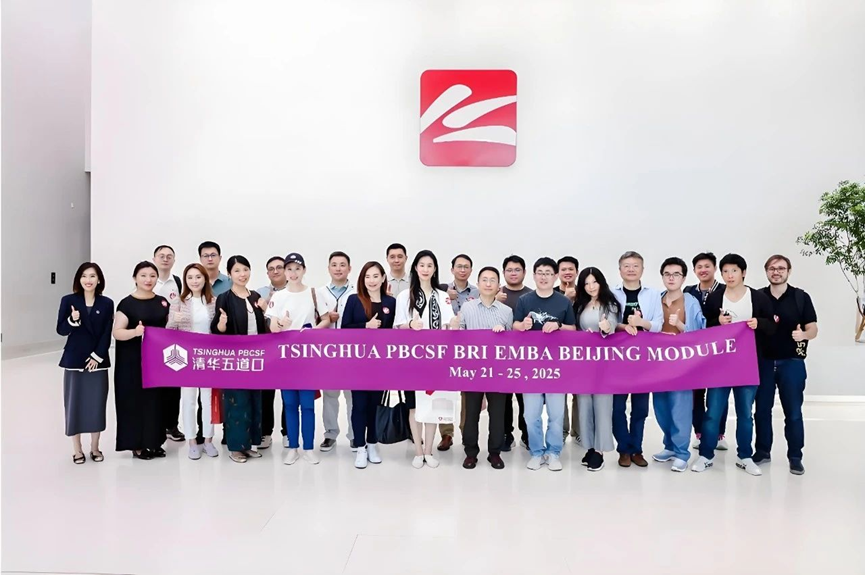
BRI EMBA students on corporate visit during the Beijing module
In-Depth Corporate Visits:
Gaining Insight into Industry Frontiers and Emerging Trends
Throughout the module, students visited several leading-edge companies in Beijing to explore the latest developments and growth trajectories across industries.
Megvii Technology:
A Pioneer in AI Vision Technologies
At Megvii, a leading AI enterprise founded in 2011 by Tsinghua alumni, students learned how the company has built a portfolio of over 2,000 patents and become a benchmark in AI vision. Since establishing its leadership in facial recognition in 2013, Megvii has expanded into consumer electronics (image recognition in Android phones), FinTech (FaceID authentication with a 70% market share), enterprise security, smart logistics, and smart cities.
During an in-depth discussion with Vice President Li Haoran, students explored FinDocX, Megvii’s intelligent document processing platform, which leverages OCR and large-model technologies to extract information from non-standardized documents. The platform processes hundreds of thousands of financial and logistics documents each month and offers both pre-set and customizable templates.
Megvii’s overseas presence spans Southeast Asia and the Middle East, with partnerships such as API integration and privatized deployments for Uniqlo. A live product demo showcased the platform’s powerful capabilities. Students were particularly intrigued by the company’s “AI Governance” philosophy and its commitment to lowering technical barriers through scalable platform strategies, sparking deeper reflections on tech ethics and industry adoption.
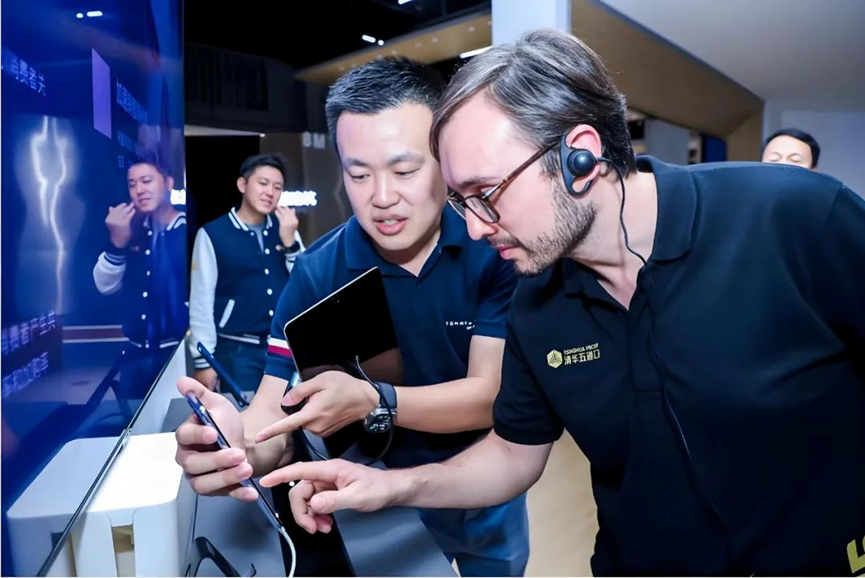
BRI EMBA students visiting Megvii
Kingsoft Office and Xiaomi:
Breaking Through with Ecosystem Synergy
At the Xiaomi-Kingsoft shared tech campus, Assistant President Chen Bo of Kingsoft Office traced the company’s 37-year journey—from developing early office software to building a complete cloud ecosystem through Kingsoft Cloud and serving 600 million users through Kingsoft Docs. The upcoming July 2024 release of WPS AI 2.0 will feature smart assistants capable of auto-generating outlines and rewriting texts, with plans to build a full-fledged “Office Brain” for enterprises. Kingsoft’s international strategy focuses on Brazil, the U.S., and Japan. Its localized interface overhaul for the Japanese market has already yielded revenue growth.
Wang Bin, Director of the AI Lab at Xiaomi’s Technology Committee, discussed the firm’s AI strategies across R&D and application. He highlighted Xiaomi’s work in natural language processing (NLP), edge-device large models, and AI-driven voice systems in smart homes, as well as imaging algorithms in smartphones. Students experienced firsthand Xiaomi’s full ecosystem—from phones to wearables—gaining valuable perspective on its “technology + ecosystem” business model.
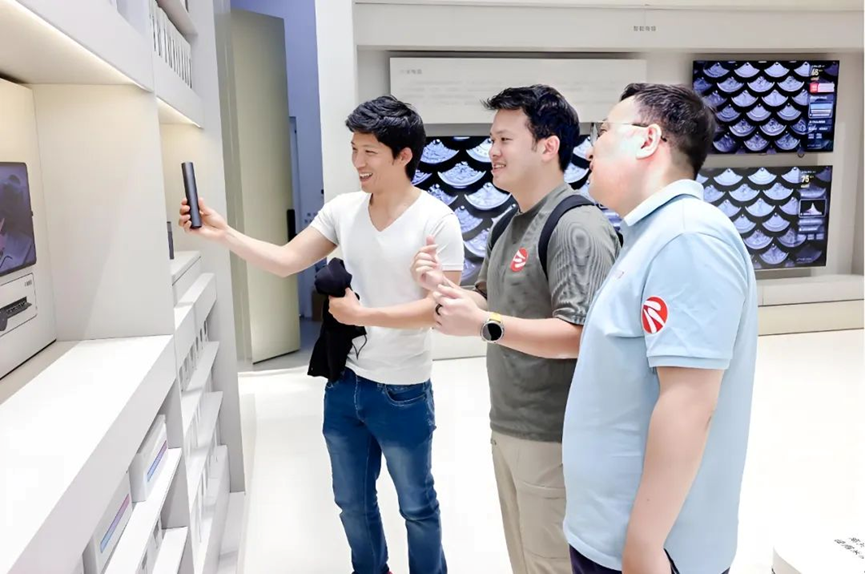
BRI EMBA students at Xiaomi headquarters
Cylingo Group:
AI-Powered Mental Wellness Innovation Led by a BRI EMBA Student
One of the highlights of the week was the visit to Cylingo Group, founded by Ren Yongliang, a current BRI EMBA student. Ren, who serves as Chairman and CEO, introduced the company behind the widely recognized “Cece” mental wellness app. Zhang Xinhua, Co-Founder, Co-President, and Chief Strategy Officer, presented the company’s enterprise-grade AI applications in mental wellness and emotional support. Their AI “Companion Therapist” system—built using NLP and emotional computing—has served over 50 million users and supports scenarios from emotional relief to career planning. Zhang discussed combining AI with traditional therapy to offer tailored solutions for eldercare and campus mental health. Their dual-engine model of “technology + service” offers a blueprint for digital transformation in the wellness sector.
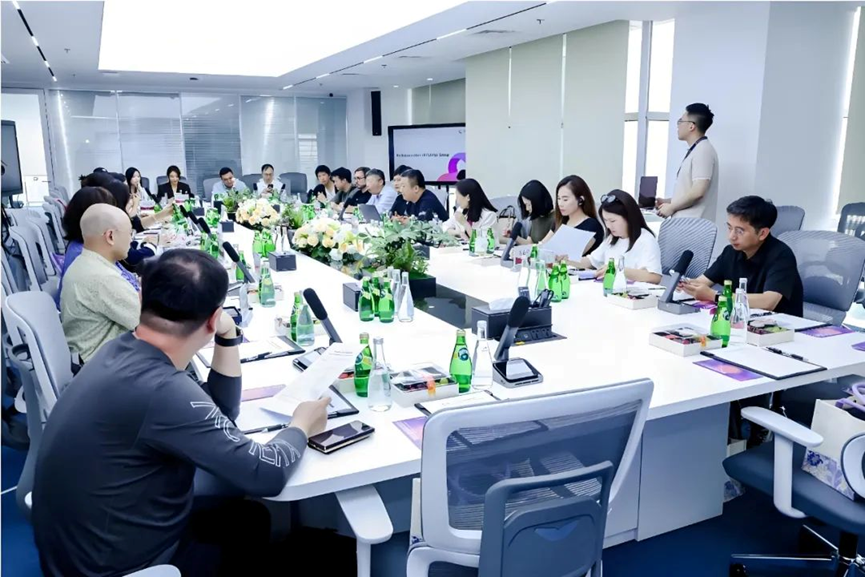
Student discussion at Cylingo Group
Expert-Led Academic Courses:
Building Strategic Vision and Core Capabilities
The academic module centered on frontier technologies and global strategy, promoting applied, cross-disciplinary learning.
In the field of brain-computer interface (BCI), Associate Professor Zhang Milin of Tsinghua’s Department of Electronic Engineering led the course “Frontiers in Brain-Computer Interface Technology: The Pathway to AI,” examining implantable and non-implantable BCIs for medical rehabilitation and human-computer interaction, alongside ethical considerations. Associate Professor Song Sen of Tsinghua’s Department of Biomedical Engineering explored neural networks and cognitive mechanisms in the course “Integration of Neuroscience and Artificial Intelligence,” using case studies in biomedical engineering to showcase AI applications in robotics and emotion recognition.
In the environmental policy and finance space, Li Xia, Deputy Director of the Ministry of Ecology and Environment’s Foreign Environmental Cooperation Center, taught “Green Investment Strategy and the Sustainable Value Chain.” Drawing on treaties such as the UNFCCC, the Convention on Biological Diversity, and the Global Plastics Treaty, she analyzed regional initiatives including ASEAN-China cold chain logistics and the global coffee supply chain. Her course outlined a cooperative framework to advance global sustainability.
Zhou Bo, Research Fellow at the Center for Strategic and Security Studies, taught “China’s Military Challenges and Strategic Responses.” Professor Cui Fan of the University of International Business and Economics presented “The U.S.-China Trade War and the Multilateral Trade System,” offering a historical and policy analysis of Trump-era trade strategies and China’s responses—including tariffs on fentanyl and reciprocal duties. He discussed the divergence between Trump 1.0 and 2.0 policies and their impact on China-U.S. negotiations and the WTO framework. Professor Ma Jie analyzed “Trade Disputes through the Lens of Game Theory,” applying classic models such as the prisoner’s dilemma to explain U.S. tariff actions and China’s strategic positioning, with comparisons to quickly-resolved trade conflicts in the U.K. and U.S.
The academic framework—built around “Technology Breakthroughs + Strategic Judgment + Decision Methodologies”—offered an elite learning experience that bridges theory and practice through joint teaching by top scholars and industry leaders.
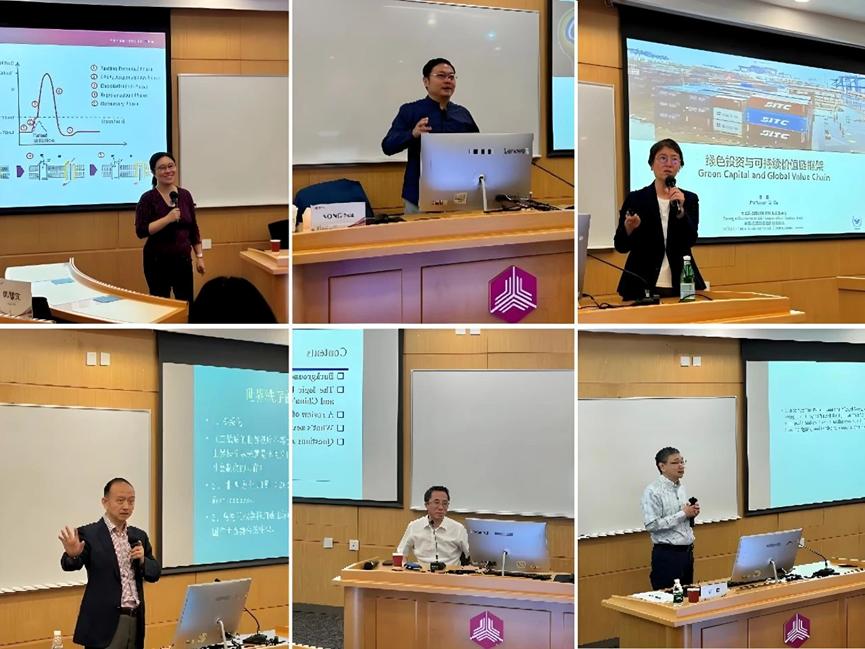
Top row: Zhang Milin (left), Song Sen (center), Li Xia (right)
Bottom row: Zhou Bo (left), Cui Fan (center), Ma Jie (right)
Interactive Peer Exchange:
Fostering Knowledge Sharing and Strategic Insight
Two signature peer-led events created valuable platforms for exchange and reflection.
“Bring Your Insight” BRI Internal Sharing Session:
Global Thinking, Local Strategies
This roundtable brought together participants from diverse sectors—energy, finance, and tech. Speakers included Frank Carroll (Managing Director & Portfolio Manager, Oaktree Capital), Fernando Scodro (Board Member, Global ImPact), Crystal He (Executive Director & CEO, DL Family Office), and Le Guan (Partner, Ocean Link). Discussions focused on navigating investment in a world of tariff-driven uncertainty.
Participants acknowledged ongoing global economic uncertainty, with a possible long-term trend toward U.S.-China duality. Asia—especially China—was seen as retaining strong growth potential.
Emerging market’s industrial chain advantage remains prominent. While China holds leadership in several sectors, Southeast Asia is competitive in sectors such as textiles. Japan’s advanced manufacturing and market openness attract growing investment. Brazil offers potential in food, commodities, and rare earths. India remains attractive but is considered overvalued in the short term. Strategic opportunities in Europe and valuation concerns in the U.S. were also highlighted.
As for corporate strategy, participants noted the growing importance of “re-localization” and “China + 1” approaches. Some firms have moved production to Southeast Asia, while Chinese firms are expanding abroad through technology exports and localized operations. Investment themes include overseas IPOs, Japan’s hotel and real estate sectors, and international expansions of Chinese tech firms.
On policy and sentiment, panelists observed that China’s recent reforms in real estate and education reflect efforts to address social needs and shift capital from property to equities. Hong Kong remains a key bridge, showing signs of investor optimism. While domestic sentiment is still fluctuating, long-term fundamentals remain positive. The discussion emphasized the need to focus on company fundamentals and long-term growth amid global volatility.
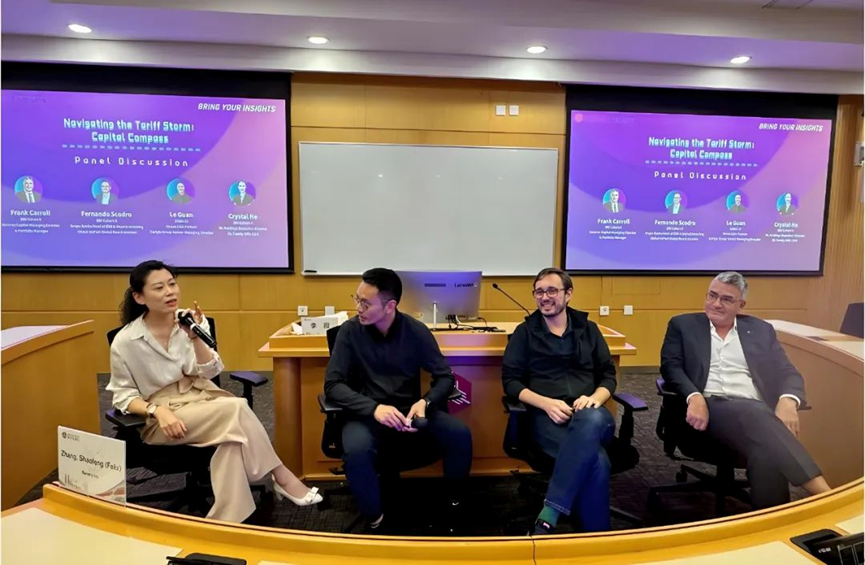
Bring Your Insight Sharing Session
Central Asia Investment Opportunities Forum:
From Policy Incentives to Practical Execution
BRI EMBA student Chen Hao spotlighted emerging logistics corridors, including the China-Kyrgyzstan-Uzbekistan Railway, which is expected to reduce Eurasian freight distance by 900 kilometers and cut delivery times by 7–8 days. With nearly 100 weekly flights between China and Central Asia, the region is becoming a logistics hub. The U.S. has already invested $60 billion in the area, and Eurasian capital is accelerating infrastructure investments.
Central Asia offers compelling advantages—political stability, abundant natural resources, tariff-free access to a 320-million-strong Eurasian Economic Union market, and low labor and land costs. Key sectors include infrastructure in Kazakhstan, import-substitution manufacturing in Uzbekistan, and re-export logistics in Kyrgyzstan. Fintech and cross-border finance are also emerging.
Chen advised that Chinese companies prioritize Kazakhstan, Uzbekistan, and Kyrgyzstan, focusing on “localized manufacturing + trade-barrier mitigation” in infrastructure and energy. He emphasized risk management, cultural sensitivity, and market research. With Central Asia at a pivotal stage, Chinese firms can achieve mutual growth through well-targeted investments.
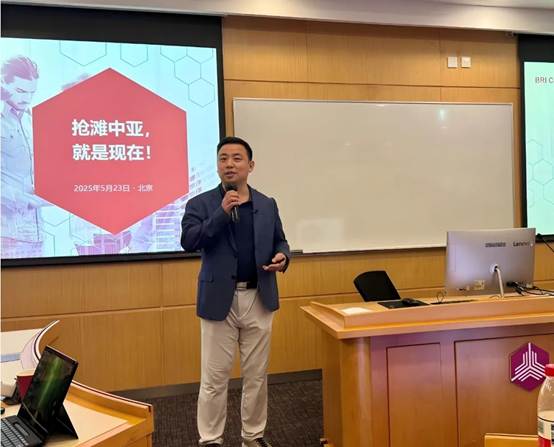
Chen Hao
The Tsinghua PBCSF BRI EMBA Beijing Module provided a rich array of learning opportunities and global engagement platforms. From immersive corporate visits to high-impact academic sessions and peer-to-peer dialogues, students deepened their understanding of industry trends, enhanced their professional capabilities, and broadened their strategic vision. The program will continue to integrate academic and industry resources worldwide to offer transformative learning experiences, empowering participants to seize opportunities and create value in the evolving Belt and Road landscape.